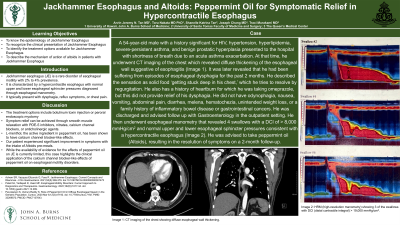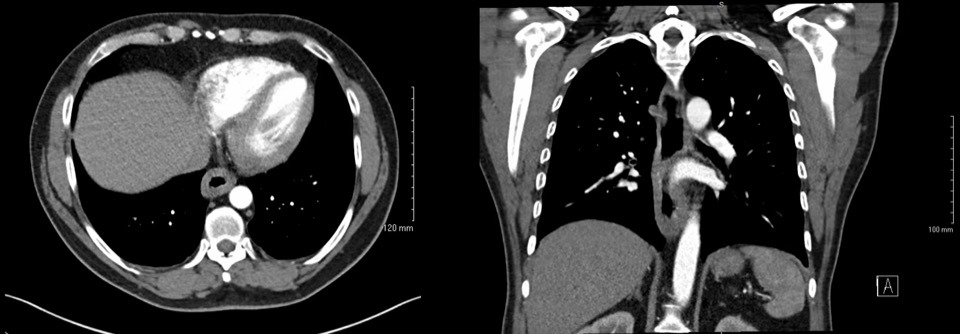Tuesday Poster Session
Category: Esophagus
P3998 - Jackhammer Esophagus and Altoids: Peppermint Oil for Symptomatic Relief in Hypercontractile Esophagus
Tuesday, October 29, 2024
10:30 AM - 4:00 PM ET
Location: Exhibit Hall E

Has Audio

Arvin Jeremy Tan, MD
University of Hawaii, John A. Burns School of Medicine
Honolulu, HI
Presenting Author(s)
Arvin Jeremy Tan, MD1, Toru Nakata, MD, PhD1, Shanelle Katrina Tan, BS2, Joseph Y. Chang, MD, MPH, FACG3, Traci T. Murakami, MD, FACG4
1University of Hawaii, John A. Burns School of Medicine, Honolulu, HI; 2University of Santo Tomas, Manila, National Capital Region, Philippines; 3The Queen's Medical Center, Ewa Beach, HI; 4The Queen's Medical Center, Honolulu, HI
Introduction: Jackhammer esophagus (JE) is a rare disorder of esophageal motility with a prevalence of 2% to 4%. It typically presents as dysphagia, reflux symptoms, or chest pain. Here, we report a case of a patient with JE with symptomatic improvement after treatment with peppermint oil.
Case Description/Methods: A 54-year-old male with a history significant for HIV, hypertension, hyperlipidemia, severe-persistent asthma, and benign prostatic hyperplasia presented to the hospital with shortness of breath due to an acute asthma exacerbation. At that time, he underwent CT imaging of the chest which revealed diffuse thickening of the esophageal wall suggestive of esophagitis (Image 1). It was later revealed that he had been suffering from episodes of esophageal dysphagia for the past 2 months. He described the sensation as solid food ‘getting stuck deep in his chest,’ which he tries to resolve by regurgitation. He also has a history of heartburn for which he was taking omeprazole, but this did not provide relief of his dysphagia. He did not have odynophagia, nausea, vomiting, abdominal pain, diarrhea, melena, hematochezia, unintended weight loss, or a family history of inflammatory bowel disease or gastrointestinal cancers. He was discharged and advised follow up with Gastroenterology in the outpatient setting. He then underwent esophageal manometry that revealed 4 swallows with a DCI of > 8,000 mmHg/cm2 and normal upper and lower esophageal sphincter pressures consistent with a hypercontractile esophagus (Jackhammer Esophagus). He was advised to take peppermint oil (Altoids), resulting in the resolution of symptoms on a 2-month follow-up.
Discussion: Jackhammer esophagus is characterized by a hypercontractile esophagus with normal upper and lower esophageal sphincter pressures diagnosed through esophageal manometry. Treatment options include botulinum toxin injection or peroral endoscopic myotomy, while symptom relief is achieved through smooth muscle relaxation with PDE-5 inhibitors, nitrate, calcium channel blockers, or anticholinergic agents. L-menthol, the active ingredient in peppermint oil, has been shown to have calcium channel blocker-like effects. Our patient experienced significant improvement in symptoms with the intake of Altoids pre-meals. While the availability of evidence for the effects of peppermint oil on JE is currently limited, this case highlights the clinical application of the calcium channel blocker-like effects of peppermint oil on esophageal motility disorders.

Disclosures:
Arvin Jeremy Tan, MD1, Toru Nakata, MD, PhD1, Shanelle Katrina Tan, BS2, Joseph Y. Chang, MD, MPH, FACG3, Traci T. Murakami, MD, FACG4. P3998 - Jackhammer Esophagus and Altoids: Peppermint Oil for Symptomatic Relief in Hypercontractile Esophagus, ACG 2024 Annual Scientific Meeting Abstracts. Philadelphia, PA: American College of Gastroenterology.
1University of Hawaii, John A. Burns School of Medicine, Honolulu, HI; 2University of Santo Tomas, Manila, National Capital Region, Philippines; 3The Queen's Medical Center, Ewa Beach, HI; 4The Queen's Medical Center, Honolulu, HI
Introduction: Jackhammer esophagus (JE) is a rare disorder of esophageal motility with a prevalence of 2% to 4%. It typically presents as dysphagia, reflux symptoms, or chest pain. Here, we report a case of a patient with JE with symptomatic improvement after treatment with peppermint oil.
Case Description/Methods: A 54-year-old male with a history significant for HIV, hypertension, hyperlipidemia, severe-persistent asthma, and benign prostatic hyperplasia presented to the hospital with shortness of breath due to an acute asthma exacerbation. At that time, he underwent CT imaging of the chest which revealed diffuse thickening of the esophageal wall suggestive of esophagitis (Image 1). It was later revealed that he had been suffering from episodes of esophageal dysphagia for the past 2 months. He described the sensation as solid food ‘getting stuck deep in his chest,’ which he tries to resolve by regurgitation. He also has a history of heartburn for which he was taking omeprazole, but this did not provide relief of his dysphagia. He did not have odynophagia, nausea, vomiting, abdominal pain, diarrhea, melena, hematochezia, unintended weight loss, or a family history of inflammatory bowel disease or gastrointestinal cancers. He was discharged and advised follow up with Gastroenterology in the outpatient setting. He then underwent esophageal manometry that revealed 4 swallows with a DCI of > 8,000 mmHg/cm2 and normal upper and lower esophageal sphincter pressures consistent with a hypercontractile esophagus (Jackhammer Esophagus). He was advised to take peppermint oil (Altoids), resulting in the resolution of symptoms on a 2-month follow-up.
Discussion: Jackhammer esophagus is characterized by a hypercontractile esophagus with normal upper and lower esophageal sphincter pressures diagnosed through esophageal manometry. Treatment options include botulinum toxin injection or peroral endoscopic myotomy, while symptom relief is achieved through smooth muscle relaxation with PDE-5 inhibitors, nitrate, calcium channel blockers, or anticholinergic agents. L-menthol, the active ingredient in peppermint oil, has been shown to have calcium channel blocker-like effects. Our patient experienced significant improvement in symptoms with the intake of Altoids pre-meals. While the availability of evidence for the effects of peppermint oil on JE is currently limited, this case highlights the clinical application of the calcium channel blocker-like effects of peppermint oil on esophageal motility disorders.

Figure: CT imaging of the chest showing diffuse esophageal wall thickening.
Disclosures:
Arvin Jeremy Tan indicated no relevant financial relationships.
Toru Nakata indicated no relevant financial relationships.
Shanelle Katrina Tan indicated no relevant financial relationships.
Joseph Chang indicated no relevant financial relationships.
Traci Murakami indicated no relevant financial relationships.
Arvin Jeremy Tan, MD1, Toru Nakata, MD, PhD1, Shanelle Katrina Tan, BS2, Joseph Y. Chang, MD, MPH, FACG3, Traci T. Murakami, MD, FACG4. P3998 - Jackhammer Esophagus and Altoids: Peppermint Oil for Symptomatic Relief in Hypercontractile Esophagus, ACG 2024 Annual Scientific Meeting Abstracts. Philadelphia, PA: American College of Gastroenterology.
